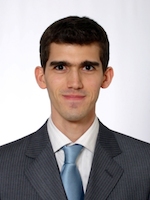 Marcelo Echague Pastore, Paraguay
Marcelo Echague Pastore, Paraguay
Junior Professional Associate
The World Bank Group, Paraguay
Public Policy Program (’13)
Marcelo completed his primary and secondary education at a French school in Paraguay’s capital, Asuncion. He obtained his Bachelors in Economics degree from the National University of Asuncion. Eager to spread his wings, he took advantage of the opportunity to work for eight months as a Foreign Language Teacher in the city of Toulouse, France, appointed by the French Ministry of Education. Marcelo came to Japan to pursue further studies in the Two-year Master’s of Public Policy Program at GRIPS in Ocober 2011. At his graduation in 2013 he received the Dean’s Award for being the best graduate of the Public Policy Program. Marcelo was also very active as a member of the International Student Council and in the organizing committee of the GRIPS Summer Program, among others. While still in Japan, Marcelo was offered a contract with the World Bank in Paraguay where he started working as Junior Professional Associate in September 2013.
Please tell us about yourself, your (education) background and other activities you were involved in before coming to GRIPS.
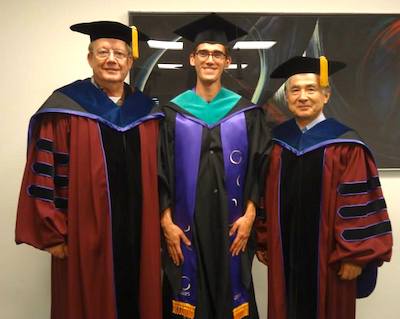
Dean’s Award ceremony, with Dean Tatsuo Oyama and Program Director Prof. James Rhodes
Despite being the son of an Argentinian mother and a Uruguayan father, I was born and raised in Paraguay, where I lived for about 25 years before I started traveling around the world. I first went to a French school in Asuncion, Paraguay, obtaining my Baccalaureate in Social and Economic Sciences. Following that career path, I then pursued undergraduate studies in Economics at the National University of Asuncion, Paraguay, obtaining the degree of Economist (with concentration in Macroeconomics) and a Merit Diploma of Honor as a Distinguished Graduate, as I ended up being the second best student of my promotion. Before my graduation, however, I had already been appointed as a Foreign Language Teacher by the French Ministry of Education, for a period of 8 months in the city of Toulouse, France (October 2010 – May 2011), where I taught English, Spanish and French at high-school level. This first international experience of living abroad proved to be extremely helpful for me, as a precursor of what my life in Japan would be soon after. It not only gave me a sense of what living alone in a different country could be, but it also broadened my spirit and mind, making me realize about the infinite possibilities that the world can offer in terms education, work, culture, social interaction, and so on.
What led you to GRIPS? What is the most important thing you got out of your studies here, and how has your experience at GRIPS prepared you for future endeavours?
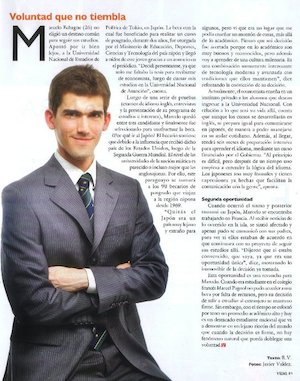
Marcelo featured in an article on studies abroad published by the Paraguayan newspaper “Ultima Hora”
Once I was awarded the MEXT scholarship to study in Japan, I started to look for a suitable university in accordance with my background and educational profile. Many Japanese universities offered programs purely-oriented in Economics and also seemed very domestic, with no good English displayed through their websites, staff and faculty. The discovery of GRIPS was a great joy, since it offered me suitable programs in the sense that they were very inter-disciplinary in their scope, by mixing Economics, Political Science, International Security Studies, and so on. Moreover, this university also proved to be extremely international, which is something I was aiming for since it would enable me to interact with people that I would certainly not easily meet in other parts of the world, such as Indonesian, Nepalese, Ugandan or Mongolian classmates, just to cite some examples. This is by far the most important thing I got out from my studies at GRIPS, since creating such tight human connection across different people from the world is something priceless that will stay with me forever and ever. Studying at GRIPS has also being extremely positive in terms of learning and being given the chance to assume leadership roles, either at the International Student Council or by working as a Research Assistant/Teaching Assistant for many different professors, together with the chance of being (continuously) invited to several high-level discussions, meetings and panel debates with top professionals in their fields (public servants, academics and executives from the private sector). Such an experience has been definitely helpful in preparing me for my present and future endeavors. Honestly, I don’t think I would have gotten my current job at the World Bank if it wasn’t for GRIPS.
My fondest memory of my time spent at GRIPS is definitely the everyday interaction with my classmates/friends and professors, by sharing and absorbing all the good things that they can offer in terms of knowledge, culture and way of living (again, this is priceless in my view). What do I miss the most about Japan? Three things: the safety on the streets, the politeness of the people and the fact that everything works/runs as it should.
What did you least enjoy about studying at GRIPS?
Tricky question, but I think that not having a sports field, a gym (rather than a fitness center) and a full-time cafeteria is something that gives GRIPS a disadvantage in comparison to other universities. Still, it’s difficult to expect all these facilities given the small number of students, with so different culinary habits, and a campus located in Roppongi, the heart of Tokyo.
What career do you hope to pursue?
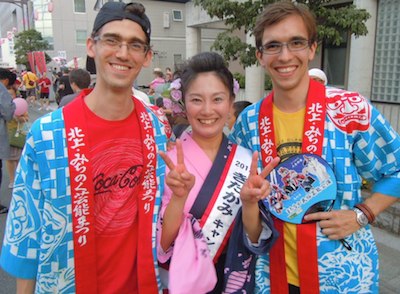
Kitakami summer festival with classmates and friends
I’ve been given the chance to do a university career, and in that context I expect to be the best professional that I can be. Since I studied Economics, I’m therefore willing to keep working as such in an international organization or cooperation agency, such as the World Bank, the IMF, USAID or JICA, just to give some examples. I hope I can follow a PhD course in a couple of years once my current Junior Professional Associate (JPA) contract comes to an end, so that I can then re-enter one of those institutions with a top-level profile and knowledge that allows me to work as a decision-maker.
You have just started working as Junior Professional Associate at the World Bank in Paraguay. Please tell us about your current tasks and responsibilities?
Among the main tasks as a JPA, I can briefly cite the following:
- Monitor the macroeconomic developments of the Paraguayan economy in collaboration with the Country Economist (please take into account that the JPA acts as the Country’s Junior Economist).
- Support the preparation of loans and projects for the assigned country and/or others.
- Contribute to the country office team activities and duties, collaborating closely with the Resident Representative in the preparation of speeches, presentations, provision of inputs/data, and so on.
In your current capacity, what do you see as the main opportunities and challenges for Paraguay over the course of the next five to ten years?
Paraguay has an estimated GDP growth of 13% for this year, which is by far the largest in the region. Such economic boost, together with a decade of stable macroeconomic conditions, has opened the eyes of international investors who are carefully looking on further developments of the economy in order to carry out their investment decisions. Nevertheless, structural problems such as weak institutions, poor governance, recurring political instability, the concentration of production in a very volatile primary sector, low access and bad quality of education and health services, as well as an extremely informal economy, generate some doubts on the sustainability of such economic growth in the middle and long-run. Such challenges cannot be undermined and therefore need to be tackled in an effective way in order to ensure inclusive and sustainable economic development.
What is your favourite thing to do when you are not working?
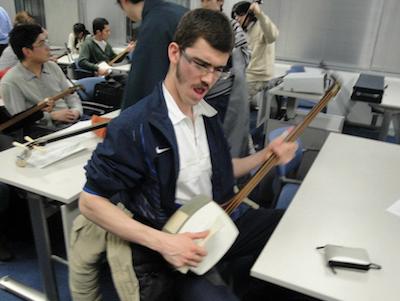
Shamisen lesson at GRIPS
As a frustrated sportsman, I like playing tennis, football or ping-pong when I’m not working. In addition, I’m also fond of attending rock n’ roll concerts, sports events, theatre plays, and visiting museums, among other activities. On holidays, and if I’m lucky enough, I also enjoy traveling abroad, especially to countries where I have never been before. That’s exactly what I tried to do when living abroad, since I visited Indonesia in Asia and all the Scandinavian countries in Europe.
If you could give one piece of advice to anyone considering studying at GRIPS what would it be?
The main piece of advice I can give to anybody studying at GRIPS is trying to make good use of the huge networking opportunities that such university can offer, not only related to the faculty (who usually come from very prestigious institutions such as World Bank, IMF, United Nations, governmental organizations, renowned academic entities, and so on) but also with other students, since they are normally mid-career public officials with very high possibilities of being promoted in the future and therefore become leaders of their respective nations. This of course should help in building tight socioeconomic relationships between all of our countries, all of the latter contributing to achieve worldwide sustainable development.
How would you like to maintain involved with the School? What do you expect from GRIPS as an alumnus?
Just as GRIPS helped me to grow as a person and a professional in my field, I’m pretty pleased that I can help promoting this institution around my region. As I told my Program Director, Prof. James Rhodes, I am truly willing to help GRIPS in whatever different context, such as interviewing potential candidates, establishing some partnership, joint-event or shared research with a local institution, just to cite some examples. In addition, I hope GRIPS will keep on posting and sending me (as well as to all the other alumni) relevant information about its progress, research, conferences and job opportunities (either at GRIPS or around the world), access to databases, and so forth.
Please tell us about your recent promotion activities for GRIPS in Paraguay. Do you have any further suggestions on how to utilize the GRIPS alumni network?
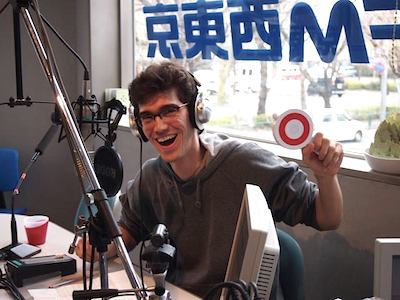
Radio broadcast on Paraguay – FM Nishi Tokyo
I have so far been able to promote GRIPS in some of the Paraguayan public institutions I had previously worked for, including the Ministry of Finance, the Central Bank and the National Securities Commission. Nevertheless, the most interesting promotion activity recently took place at the National University of Asuncion, since not only I had some materials to distribute (thanks to Karin
Hillen and Nicolas Julliand for that) but I could also make a little Power Point presentation on GRIPS and studies in Japan, which was very well received by those students attending my talk. In fact, I think there is a lot more that can be done in this field and I shall concentrate all of my efforts in that. As a suggestion, I humbly believe that the GRIPS alumni network could be strengthened particularly in the (relatively ‘forgotten’) regions of Latin America, North America and Western Europe, by trying to develop a closer linkage between GRIPS, local universities and public institutions interested in sending their staff to GRIPS.





